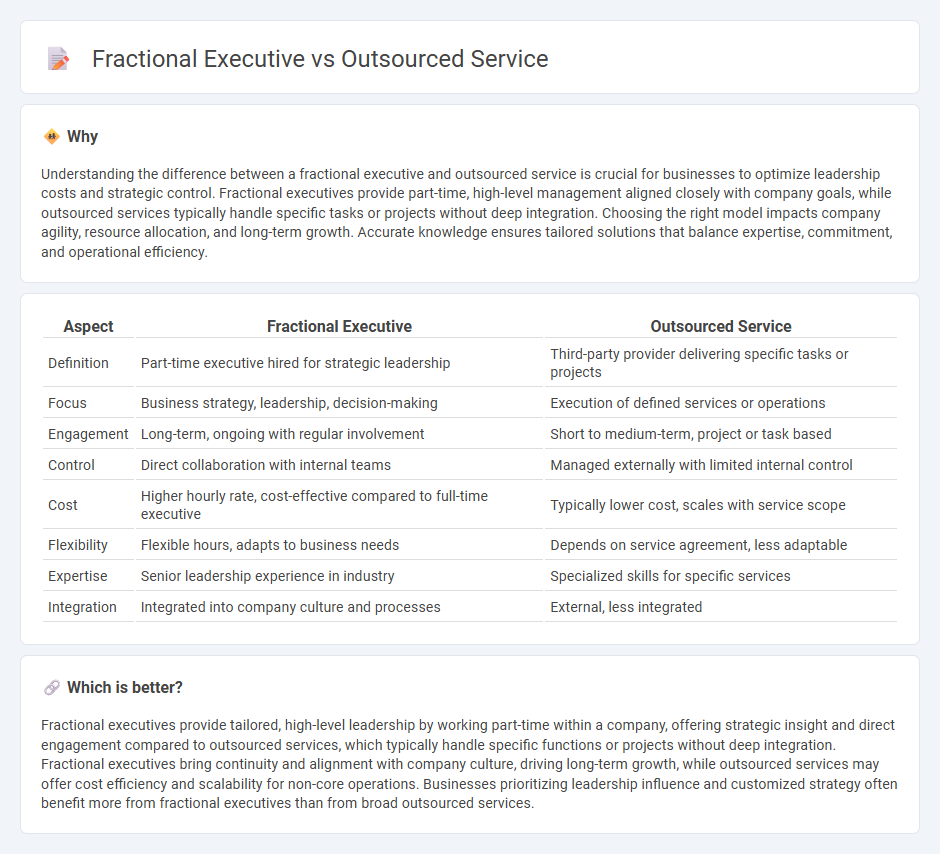
Fractional executives provide businesses with part-time, high-level leadership tailored to strategic goals, offering expertise without the commitment of a full-time salary. Outsourced services, on the other hand, involve delegating specific operational functions to external companies, focusing on efficiency and cost reduction. Discover how choosing between fractional executives and outsourced services can optimize your organizational performance.
Why it is important
Understanding the difference between a fractional executive and outsourced service is crucial for businesses to optimize leadership costs and strategic control. Fractional executives provide part-time, high-level management aligned closely with company goals, while outsourced services typically handle specific tasks or projects without deep integration. Choosing the right model impacts company agility, resource allocation, and long-term growth. Accurate knowledge ensures tailored solutions that balance expertise, commitment, and operational efficiency.
Comparison Table
| Aspect | Fractional Executive | Outsourced Service |
|---|---|---|
| Definition | Part-time executive hired for strategic leadership | Third-party provider delivering specific tasks or projects |
| Focus | Business strategy, leadership, decision-making | Execution of defined services or operations |
| Engagement | Long-term, ongoing with regular involvement | Short to medium-term, project or task based |
| Control | Direct collaboration with internal teams | Managed externally with limited internal control |
| Cost | Higher hourly rate, cost-effective compared to full-time executive | Typically lower cost, scales with service scope |
| Flexibility | Flexible hours, adapts to business needs | Depends on service agreement, less adaptable |
| Expertise | Senior leadership experience in industry | Specialized skills for specific services |
| Integration | Integrated into company culture and processes | External, less integrated |
Which is better?
Fractional executives provide tailored, high-level leadership by working part-time within a company, offering strategic insight and direct engagement compared to outsourced services, which typically handle specific functions or projects without deep integration. Fractional executives bring continuity and alignment with company culture, driving long-term growth, while outsourced services may offer cost efficiency and scalability for non-core operations. Businesses prioritizing leadership influence and customized strategy often benefit more from fractional executives than from broad outsourced services.
Connection
Fractional executives provide specialized leadership on a part-time basis, enabling companies to access expertise without the full-time employment commitment. Outsourced services complement this model by handling specific operational functions externally, reducing overhead and improving efficiency. Both approaches offer flexible, cost-effective employment solutions that help businesses scale rapidly while maintaining strategic focus.
Key Terms
Cost Structure
Outsourced services typically operate on a project or retainer fee model, offering fixed or variable costs that scale with service scope, while fractional executives provide part-time leadership with salary-based compensation proportional to time committed. Cost efficiency in outsourced services often stems from leveraging specialized teams, whereas fractional executives deliver strategic value through hands-on decision-making without the expense of a full-time salary. Explore detailed comparisons to determine which cost structure aligns best with your business goals.
Control & Decision-Making
Outsourced services provide external teams to handle specific business functions, often limiting direct control and decision-making authority to the client organization. Fractional executives integrate directly into company leadership, granting them significant influence over strategic decisions and operational control while offering flexible, part-time expertise. Explore how choosing between these models impacts your company's governance and strategic agility.
Expertise Level
Outsourced services typically provide specialized skills for specific tasks or projects, often at a more tactical execution level, while fractional executives bring strategic leadership and high-level decision-making expertise on a part-time basis. Fractional executives integrate deeply with company culture and long-term goals, driving growth and operational efficiency with executive experience across industries. Explore how leveraging fractional executives can elevate your business strategy and leadership impact.
Source and External Links
What Is an Outsourcing Service Provider? A Comprehensive Guide - An outsourcing service provider is a company specializing in handling non-core business tasks such as customer service, IT support, or HR functions to help other businesses save time and costs while focusing on core activities.
Customer service outsourcing: Pros and cons + guide - Zendesk - Customer service outsourcing involves hiring third-party companies to manage customer interactions through various methods such as call centers, with options including onshore, nearshore, and offshore outsourcing depending on cost and language considerations.
21 Most Commonly Outsourced Services in 2025 - Common outsourced business services include IT support, customer service, payroll, accounting, digital marketing, content creation, and recruitment, which help companies reduce costs and focus on core operations.
 dowidth.com
dowidth.com